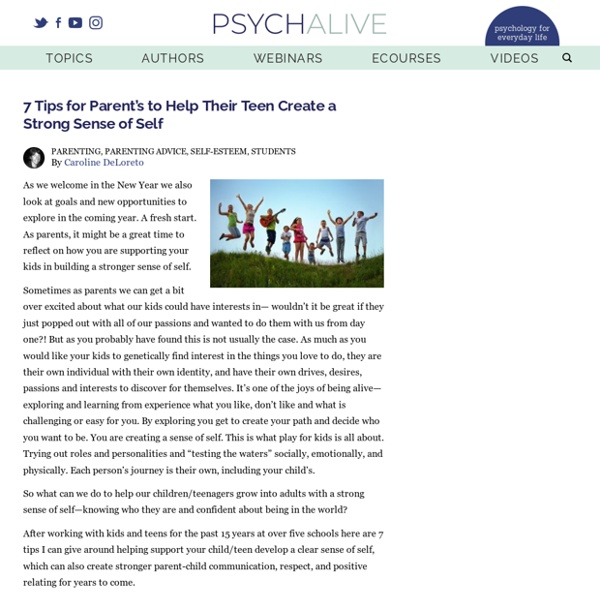Understanding Your TeenagerThe Center for Parenting Education
In this 2nd part of the series, we explore the developmental growth of teens which can cause huge emotional and social changes during adolescence. A lot of confusion and tension can be lessened when parents are clearer about why their teenagers act as they do. But the stress of adolescence is not inevitable. In truth, only about 10% of teens in our society experience major disruptions and find themselves in serious trouble. Cultural Influences It is interesting to consider that in primitive cultures, adolescents have similar physiological changes, but do not have many of the other characteristics of teens in our society.
Read: How Parents Can Help Their Teens Develop Autonomy
Children express a desire for autonomy at two stages—toddlerhood and adolescence. This sense of self-governance—feeling, behaving, and thinking independently—becomes particularly profound in the latter set of years, as adolescents have more of an understanding of the world around them and confidence in their own abilities. While every parent wants their child to grow in this way and doing so is important to living a happy and productive life as an adult, this transition often comes with some difficulties—both for sons and daughters as well as mothers and fathers. Types of Independence Adolescents can become healthy, autonomous adults that are not controlled by other people or external forces through practicing autonomy in the following three ways: Emotional
Six Ways to Build Your Teen's Identity - Focus on the Family
Marriages and families are in trouble after the challenges of last year. If it's not too much to ask, would you help equip these families with the resources they need to put Jesus at the center of their home? Yes, I will help struggling families! Español Helping Families Thrive™
Read: 6.3 Adolescence: Developing Independence and Identity – Introduction to Psychology
Learning Objectives Summarize the physical and cognitive changes that occur for boys and girls during adolescence.Explain how adolescents develop a sense of morality and of self-identity. Adolescence is defined as the years between the onset of puberty and the beginning of adulthood. In the past, when people were likely to marry in their early 20s or younger, this period might have lasted only 10 years or less—starting roughly between ages 12 and 13 and ending by age 20, at which time the child got a job or went to work on the family farm, married, and started his or her own family. Today, children mature more slowly, move away from home at later ages, and maintain ties with their parents longer.
Parents Can Play An Active Role In The Identity Formation Of Their Adolescent Children
Mainstream belief regarding identity theory tends to portray adolescents as the sole agents involved in their identity development. However, a new article in the Journal of Research on Adolescence reveals that parents are concerned, involved, and reflective participants in their children’s identity formation. Elli Schachter, PhD, of Bar Ilan University and Jonathan Ventura of the Hebrew University of Jerusalem, studied parents, adolescents, and educators affiliated with the Orthodox Jewry in Israel. Researchers documented and described parents that invested a great amount of time and effort thinking about their children’s identity, even fashioning their own lives with their children’s future identities in mind. The parents demonstrated the extent to which they saw themselves as active participants in their children’s identity formation. Such thinking and planning can be very complex, taking into account broad socio-cultural factors, personal psychological dynamics, and ethical concerns.
Read: Identity Achievement and Your Teen
As your child grows up and experiences different phases of development, it might help to know what some of those phases are, and what they really mean in the long run to your tween and his or her adolescent experience. The definition of identity achievement isn't a difficult concept to grasp. It simply refers to having found one's true sense of self.
James Marcia and Self-Identity - Child Development Theory: Adolescence (12-24)
James Marcia is another influential theorist who expanded upon Erikson's concept of identity crisis and identity confusion. His initial work was published during the 1960's but his theory continues to be refined in accordance with recent research findings. Although Marcia's theory originally conceptualized identity development in terms of a progressive developmental trend, his theory has subsequently become more descriptive and categorical, defining and identifying particular configurations of identity exploration and commitment. Marcia's theory descriptively categorizes four main points or stations along the continuum of identity development. These stations or points describe very different identity conditions, ranging from a diffuse and indeterminate individual identity to a precisely defined and highly specific individual identity. Marcia used the term identity status to label and describe four unique developmental identity stations or points.
Read: How Adolescents Search for Identity - iMom
Menu Search Close Share what kind of mom you are!



